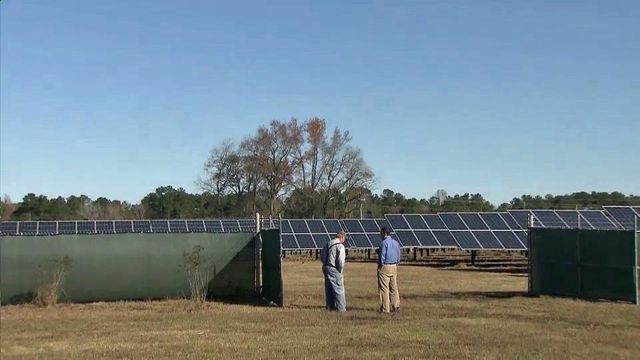End of state incentives could bring clouds to solar industry
North Carolina has been basking in a solar bonanza for several years, but the end of state incentives could bring come clouds to the horizon.
Posted — UpdatedSoutheastern North Carolina has seen a concentration of solar farms, with dozens sprouting up among the flat fields of Robeson, Bladen and Columbus counties.
Dawson Singletary was walking ground that was used for growing peanuts and wheat a few years ago. These days, he’s farming a new crop that doesn’t need rain, just plenty of sunshine.
“We tend about 500 or 600 acres,” said Singletary. “I wanted to keep the land in the family because it’s been in the family for about six generations, at least.”
Singletary could have built hog houses on the 25 acres of land outside Bladenboro, or he could have sold the property to a mobile home park to generate money.
“We were in a pretty bad financial situation and health situation,” said Singletary.
He saw the light in the form of 21,600 solar panels. The solar power generated on the farmland is sold to Duke Energy and helps provide power to more than 800 customers around Bladenboro.
“The advantage is, I have no input costs, and it’s a steady income,” said Singletary.
He leases his land to the Chapel Hill-based Solar Strata, which has built nearly 100 solar farms in the state since 2011.
“It’s really one of the best games in town,” said Brian O’Hara, a senior vice president of the firm.
He said the solar industry has powered up the tax base for rural counties without being a drain on resources.
“We don’t need new roads. We don’t need new schools. We don’t need emergency services. It’s certainly going to mean there are farms that Strata would have done that we now won’t do in North Carolina,” said O’Hara.
The solar industry had received $281 million in credits between 2010 and 2012.
Despite the elimination of the tax credit, O’Hara said that the industry will not be disappearing. He said the solar farm boom has made solar energy cheaper for customers and created a demand.
O’Hara noted that solar doesn’t carry the negative aspects of smell, noise and waste that can be produced by other energy source.
“As far as a neighbor, it’s a lot better than even my farming operation,” said Singletary.
• Credits
Copyright 2024 by Capitol Broadcasting Company. All rights reserved. This material may not be published, broadcast, rewritten or redistributed.






